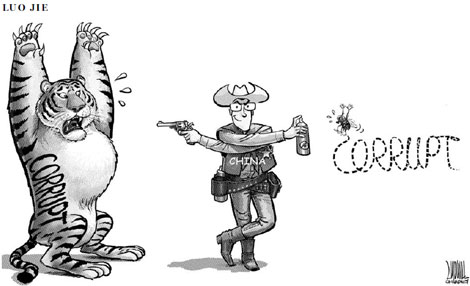Chinese media is apparently busy bringing corrupt officials to public notice as recently demonstrated by televised confessions in reality TV airing from Beijing. In the past three years, the Chinese media has hunted and interviewed various Chinese officials accused of corrupt activities within one of the strongest state systems in the world. The stories fascinate and provide insight into how one affords 18 mistresses and offerings of exotic wildlife platters. One can argue that Chinese media appears to be taking up the role of the fourth pillar essential for liberalizing society, which helps expose official corruption.
Critics of the Chinese state see this as a satisfying development as the Communist Party officials are challenged by corruption, which may signal weakening control. Only million or so corrupt officials have been arrested in the past three years of Beijing’s and “Tigers and Flies” campaign. Some argue this is the state’s strategy of keeping the public gratified, others argue that too many corrupt officials can destabilize the party. No doubt, governments walk a fine line, a tight rope between approving public or a disillusioned citizenry.
Another perspective is that we are looking at a subtle form of the neo-Cultural Revolution: a mellower version of the purge that took place in the 1960s. In the current phase, only a million have been charged so far. Chinese media’s corruption report is but a channel for containing societal norms that have kept the Communist Party in power. How does the state distinguish itself from competing western societies? By distinguishing itself as a non-western, non-consumerist society that represents unique Asian values; by sending an important message through media institutions that are not necessarily watch dogs, rather an arm of the state.
Not to defend corrupt people who eat alligator tails and other exotic creatures given that we are in middle of the sixth mass extinction or to defend rampant consumerism in a society containing masses of poor, but this blog is on the state of the media, not on the state of our planet (which frankly is a lot more serious issue). Media, historically in most of the world, independent or otherwise, rarely challenges the state, especially in the developing world where it is an instrument of the state rather than a watch-dog for civil society.
One can see this is in democratic India and democratizing Pakistan as well. Tense periods, as in the current post-Uri attack in Kashmir, is the best time to observe the media. Since the Uri attack on September 18, mainstream media have pretty much supported Prime Ministers Modi or Nawaz Shariff in their respective countries except for a notable few journalists. Cyril Almeida of The Dawn in Pakistan, for example, recently reported a meeting between the government and the military in regards to the country’s international position, really not a big deal except for the fact that it was reported at a time when relations are tense. For that, he was banned from leaving the country and faced imminent arrest. Kudos to some elements of Pakistani media that on occasion confront authoritarianism.
The mainstream media in India usually tends to stay away from such critical activity (except for some exceptions such as The Citizen). An example of this is the question of did India engage in a surgical strike or not? India claims it did and Pakistan says “nope,” and the media in both countries just reported whatever the state said. Evidence is missing and it doesn’t really matter, because the two states usually engage in shooting over the LOC anyway, crossing the de facto border at times. The citizens must support their governments at times like this is generally the rule.
Current Bollywood films with Pakistani stars.
Fanfare around cricket is usually shaped by patriotism, but since there are no games scheduled anytime soon between the two, Bollywood is luckily providing us with some material for patriotic activity. Karan Johar, famous for his Koffee with Karan, and even more famous for his friendship with Shahrukh, is unlucky enough to be releasing his Ae Dil Hai Mushkil in middle of this chaos. His film includes stars such as Aishwarya, Ranbir, etc. but it also includes Pakistan’s Fawad Khan. In this flurry of patriotism, MNS, Shiv Sena’s splinter group, told him no bloody way. Karan begged for forgiveness and promised he will never engage Pakistani stars again because he is an Indian first. Meanwhile, he spent huge amounts of money on this film, man! His appeal to the Center was answered as the home minister granted him permission. Following, MNS also agreed as long as no one has fun watching the film. Of course, one should go see the movie at their own risk if some theaters are willing to show it.
In response, Pakistan ordered a ban on Indian channels, films, etc. although some Pakistani media carriers protested. It’s too bad because these civil spaces keep each other somewhat friendly and the cultural industries provide such entertainment for both sides of the border, Rahat, Veer Zara, Sonu Nigam, et al. Thankfully, not all surrender to the state’s demands.
writer: Anshu N. Chatterjee

